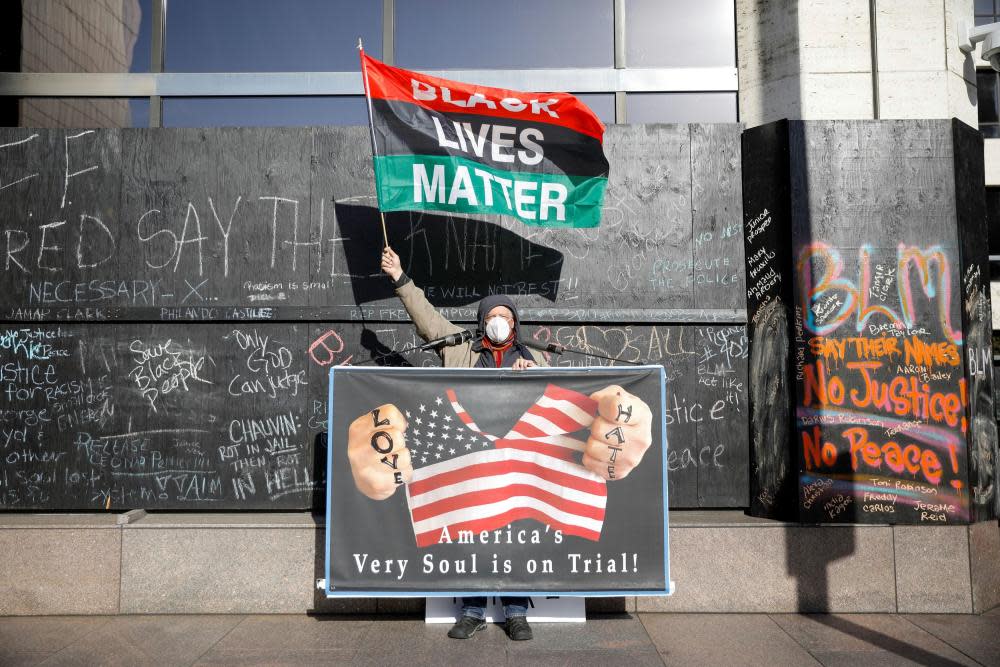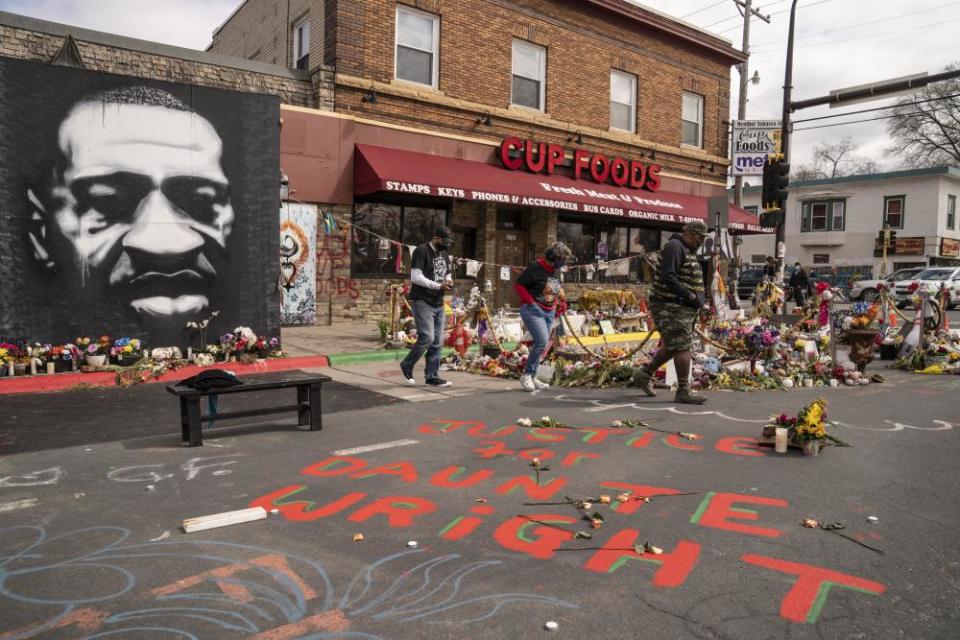Daunte Wright and George Floyd: another chapter in America’s recurring tragedy

It was shortly after midday on Thursday at the New Salem Missionary Baptist church in Minneapolis. In front of a towering stone facade, Katie Wright stood at the pulpit, almost dwarfed by the plexiglass lectern and mass of microphones in front of her. She shuddered with grief, held by members of her family.
Five days earlier, her son, Daunte Wright, a 20-year-old father of one, had been shot and killed by a single bullet fired by a white police officer in the city suburb of Brooklyn Center. Four nights of unrest had followed with hundreds of protesters clashing with police dressed in riot gear, pelting crowds with teargas and rubber bullets.
The police shooting had occurred at a pivotal moment in the city’s history as another white officer, Derek Chauvin, stood trial over the death of another Black man, George Floyd, in a courthouse just a few miles down the road.
One city. Two fatalities. And another chapter in a recurring American tragedy.
Related: This much is clear: Derek Chauvin’s trial won’t change policing in America | Simon Balto
As Katie Wright spoke before the assembled press, she said that her family and George Floyd’s were not just tied together by mourning and trauma. In an astounding revelation, she said that Daunte had been taught at Edison high school by George Floyd’s girlfriend, Courteney Ross, who just two weeks ago had testified for the prosecution in Chauvin’s murder trial.
“It was very emotional,” she said of meeting Floyd’s family for the first time. “She [Ross] remembered him [Wright] playing basketball. And she remembered him just being that smiley, goofy kid. It was so sad that we had to meet that way, and that our families connected in that way.”

The city of Minneapolis had been on edge before the shooting of Daunte Wright, with National Guard troops lining the downtown area and the county courthouse encased in a mesh of concrete barriers and barbed wire, but Wright’s death tipped tensions over the edge.
“This just added gasoline to the fire,” said Quinn Redeemed, a 46-year-old protester, stood outside the Brooklyn Center police department on Monday after the first night of unrest. Her Black Lives Matter flag swayed in the wind, pounded by icy rain. “We are tired and fired up.”
Now, with closing arguments in the Chauvin murder trial set for Monday, perhaps the most significant murder trial in the history of American policing seems set to conclude within days as the prosecution of another officer merely begins. The fate of Derek Chauvin will soon lie in the hands of 12 jurors, and their decision will have ramifications not just in this American midwestern city, but around the world.
‘Murder, it was murder’
It was 12.15 on Monday afternoon when police in Brooklyn Center released body camera footage showing the moment Daunte Wright was killed. Officer Kim Potter, a 26-year veteran of the force, took part in a traffic stop, which police say started because Wright’s car had an expired license plate.
The blurry footage shows a brief scuffle between Wright and two officers. She pulls out her Glock handgun and shouts “Taser!” three times, before firing a bullet. “Oh shit, I shot him,” she says as the car speeds away.
At a media briefing in the police department headquarters to mark release of the footage, police chief Tim Gannon argued the shooting was “an accidental discharge” with officer Potter mistaking her gun for a Taser. But in a waiting area next door, where a small group of activists had assembled and watched on their phones with the Guardian present, the reaction was more visceral.
“Murder, it was murder,” Jonathan Mason, a community organizer, shouted over and over again after watching the fatal shot, disbelieving it was possible for a seasoned officer to mistake a bright yellow Taser electroshock weapon for a black pistol.

Two hours later, and nine miles down the road at the Hennepin county courthouse, George Floyd’s younger brother Philonise was among the last of 38 witnesses to testify for the prosecution against Derek Chauvin.
Through tears he told the jury how his brother had led their household as a child, how much he had loved his mother, and how much he was missed.
“He just was like a person everybody loved around the community. He just knew how to make people feel better,” Floyd said in the sterile courtroom, broadcast live across the world. That afternoon the prosecution concluded, with many observers describing it as the most overwhelming case against a former police officer they had ever seen.
A number of senior Minneapolis police officers, including the chief of police, had testified against their former colleague, numerous medical experts attested that Chauvin’s use of a nine-minute and 29-second knee-to-neck restraint had been the primary cause of Floyd’s death, and many eyewitnesses spoke powerfully about their ongoing trauma having watched George Floyd die.
But as the prosecution in the Chauvin case rested on Monday, the fate of officer Potter remained distinctly unclear.
‘Police officers don’t have to fight fair’
Police in the United States kill roughly 1,100 people a year with only a tiny proportion of those cases resulting in criminal prosecution for the officers involved. Between 2005 and 2019, according to research at Bowling Green State University in Ohio, 104 police officers were arrested for murder or manslaughter with just 35 convicted of a crime.
The statistics reflect the difficulty that prosecutors face in convicting American police officers, who often benefit from significant union protection, different legal standards over the use of fatal force and implicit bias borne of conflicts of interest within the US criminal justice system.
The concern around securing a conviction in the Chauvin case was evident when Minnesota attorney general Keith Ellison announced charges against the four officers involved in Floyd’s death, who cautioned it would take months to bring the case to court.
“The reason thoroughness is important is because every single link in the prosecutorial chain needs to be strong. Trying this case will not be an easy thing. Winning a conviction will be hard,” he said in June last year.
Chauvin’s defence began after another night of unrest on the streets of Minneapolis. A phalanx of officers beat their riot shields and fired volleys of teargas into the crowds who chanted Daunte Wright’s name. Keith Ellison himself appeared on the streets as police cleared most demonstrators shortly before midnight.
He spoke directly to those who remained. “This thing [Wright’s death] is not going to be swept under the rug. We’re going to deal with it in a real way,” he assured them.
On Tuesday morning, shortly after 9am, the defence began calling its first witnesses. Their argument throughout has essentially been to blame Floyd’s death on his own heart problems and drug use, and suggest that Chauvin’s use of a prolonged restraint was a justifiable use of force. They need only one juror to side with them to force a mistrial, as any conviction must be a unanimous decision.

The defence called a use of force expert, Barry Brodd, a former California officer with a notorious past. Brodd previously testified in defence of the white officer, Jason Van Dyke, who shot and killed black teenager Laquan McDonald in 2014. Van Dyke opened fire 16 times and Brodd told the jury in that case that each shot was a justified use of force. Many were fired while McDonald lay dying on the floor.
Throughout his testimony on Tuesday, Brodd argued that Chauvin’s use of restraint had been proportionate to the threat that the unarmed man, unconscious for more than four minutes, posed to officers.
“I felt that Derek Chauvin was justified, and was acting with objective reasonableness,” he told jurors. “Police officers don’t have to fight fair. They’re allowed to overcome your resistance by going up a level.”
During a break in Brodd’s testimony, as a snow storm pounded the grounds of the courthouse, the Floyd and Wright family met for the first time, embracing in tears. Naisha Wright, Daunte’s aunt, chanted her nephew’s name as she wore a T-shirt with George Floyd’s image.
“My nephew’s blood is on your hands …,” she said, her body shaking. “Hold her [Potter] accountable. Hold her higher than accountable.”
As she was speaking, news came that both Kim Potter and police chief Tim Gannon had resigned from the force.
‘Can we get a conviction?’
The death of George Floyd prompted significant police reform efforts in the city of Minneapolis. The city council voted for police budget cuts and to redirect significant funds, $8m, to create new mental health teams that will be able to respond to certain 911 calls. The city also approved a landmark settlement with the Floyd family of $27m.
Asked if Daunte Wright’s death had set these reform efforts back, Minneapolis mayor Jacob Frey was frank: “It’s impossible to course-correct 400 years of systemic oppression in one single policy, or in any one single effort,” he said in a statement to the Guardian.
It was the middle of Wednesday morning when prosecutors announced that Kim Potter would face manslaughter charges over the death of Daunte Wright, less than four days after he was killed.
The defence in the Chauvin case had called their final witness: forensic pathologist David Fowler. He told the jury that it was George Floyd’s heart conditions, his drug use and potentially carbon monoxide poisoning from the exhaust of a patrol car that had killed him.
Fowler, who trained in apartheid South Africa, is being sued by the family of a Black teenager, Anton Black, in Maryland, who died after three police officers held him face down in 2018. Fowler ruled that Black had died from “natural causes” prompting the American Civil Liberties Union to accuse him of being “complicit in creating false narratives about what kills Black people in police encounters”.

On the stand, the pathologist cast doubt on Floyd’s official autopsy, which ruled his death a homicide, stating he had, in fact, determined it was “undetermined”.
Chauvin’s defence announced they intended to call no further witnesses on Thursday, bringing the trial into its closing stages.
Hours after the court went into recess, Daunte Wright’s family emerged into the public once more, the beginning of their legal journey just starting.
The family’s attorney, Benjamin Crump, who also represents the Floyd family, expressed frustration that prosecutors had not charged Potter with third degree murder. But he reeled off a list of other unarmed Black men and boys, killed by police in recent years with the officers never criminally charged.
Michael Brown in Ferguson, Missouri. Eric Garner in New York City. Tamir Rice in Cleveland, Ohio.
“It’s a long journey to justice,” Crump said. “We have to remember, not so long ago they weren’t charging any police officer for killing a Black person. So we’re making progress in America. Are we at a point where we can say it’s equality? Oh, we’re a long way from that.”
Naisha Wright could not contain her anger.
“Justice? What is justice? Will we get to see Daunte’s smile? We don’t get to see that,” she said. “The highest accountability? I know the highest is going to be judged by God. But can we get a conviction?”
Both families will still have to wait and see.

 Yahoo Movies
Yahoo Movies 
